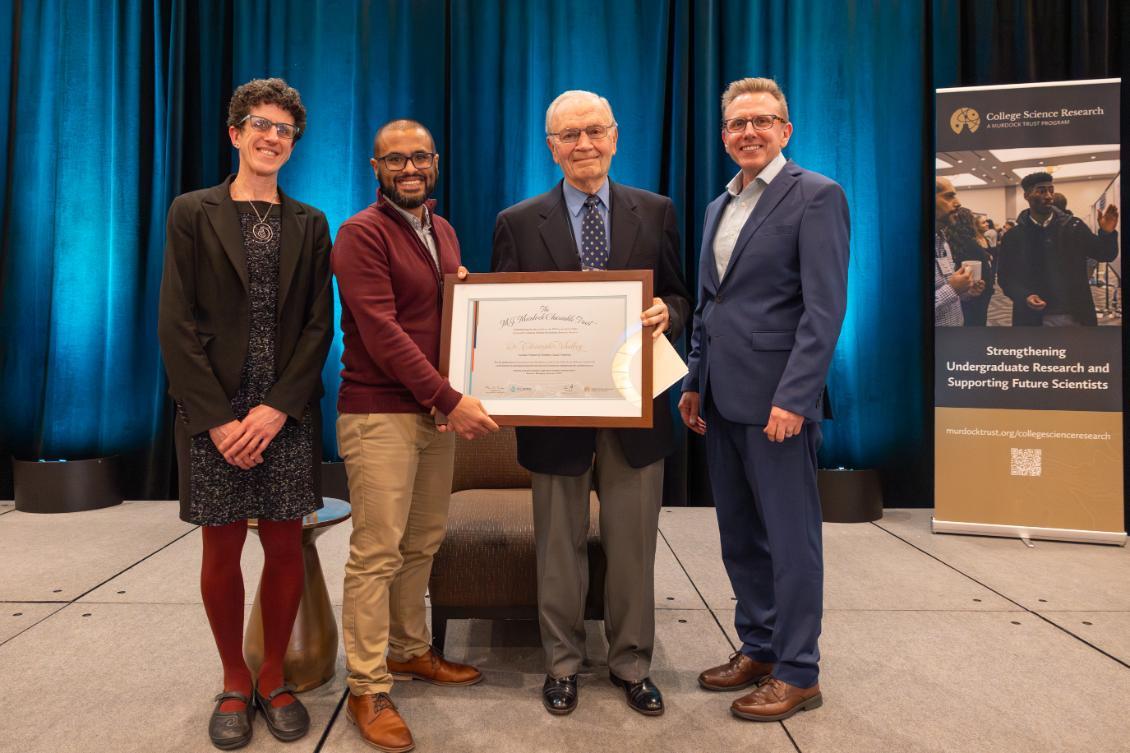/0x35:2400x1566/prod01/channel_34/media/seattle-university/news-amp-stories/images/ChrisWhidbeyChemistry_yk_014.JPG)
Dr. Christopher Whidbey and students conducting research in the lab.
Associate Professor Christopher Whidbey, PhD, ’10, is recognized with two prestigious awards to fund ongoing undergraduate research.
Inspired by his experience as an undergraduate researcher, Christopher Whidbey, PhD, ’10, returned to Seattle University in 2018 as an associate professor of chemistry to mentor the next generation of scientific minds.
And that research and mentorship just got a boost as Whidbey has been awarded funds from the National Institutes of Health (NIH) through the Academic Research Enhancement Award (AREA) for Undergraduate-Focused Institutions. Additionally, he’s been recognized with the Lynwood W. Swanson Promise for Scientific Research Award.
Both awards will expand undergraduate biomedical research at SU and are a testament to Whidbey’s success in groundbreaking research focused on microorganisms in the vaginal tract that promote health and disease. Previously, Whidbey received the 2023 Cottrell Scholar Award, which provided $100,000 in funds to develop a course integrating genome sequencing with microbial communities related to maternal-child health. The funding helped pay for six undergraduate researchers.
The NIH award provides funding for summer and academic year research opportunities for 15 undergraduates over the span of the three-year award. The NIH AREA program focuses on supporting cutting-edge science and strengthening the research environment at undergraduate institutions.
 Christopher Whidbey accepting the Swanson award.
Christopher Whidbey accepting the Swanson award.
With the funding support Whidbey and undergraduate researchers will continue his research of bacteria in the vaginal microbiome and the crosstalk between the bacteria and host. Changes in the vaginal microbiome can cause bacterial vaginosis, pelvic inflammatory diseases and STIs. During pregnancy they are associated with preterm birth, the leading cause of perinatal mortality. Now knowing that healthy bacteria in the vaginal microbiome can help prevent infections, Whidbey’s goal is to understand how to use information about the chemical crosstalk to develop treatments for preterm birth and bacterial vaginosis.
“We’ll be looking for factors that nobody has identified before. It’s risky, but we’re asking really important questions,” Whidbey says. “There is so little we understand about the vaginal microbiome."
The Swanson Promise Award is given annually from the M.J. Murdock Charitable Trust to a junior professor who shows potential in establishing a productive and sustainable research program. Whidbey was specifically selected for his “application of innovative cross-disciplinary tools to the study of microbiomes and for his commitment to providing impactful and inclusive laboratory experiences for undergraduates.” The award includes $10,000 to be allocated toward one summer student stipend, research supplies and additional student researchers.
“It’s a huge honor and I’m very humbled by it,” Whidbey says. “The other folks who have won this award or received honorable mentions are fantastic professors who I really admire.”
Whidbey believes undergraduate research is becoming more important as information becomes increasingly accessible. SU has an interdisciplinary emphasis on the ethics and philosophy behind research, encouraging students to reflect on the research and how it will help create a better world. SU’s small class sizes, Whidbey notes, make it possible for students and professors to work closely in labs, which is unique at the undergraduate level.
“Students don’t need me to tell them to memorize a bunch of facts. What they need is somebody showing them how to apply that information to solve problems—that's what research is,” Whidbey says. “We’re able to do actual science here with students and all the messiness that goes along with it.”
Check out this video featuring Professor Whidbey showcased at the awards ceremony.
/0x42:2400x1558/prod01/channel_34/media/seattle-university/news-amp-stories/images/Tony-Varona-portrait.JPG)
/0x54:1130x768/prod01/channel_34/media/seattle-university/news-amp-stories/images/1.-Trung-pham-work-on-display--copy-1130X821.jpg)
/67x0:2334x1432/prod01/channel_34/media/seattle-university/news-amp-stories/images/SURoofTops_yck_001-copy.jpeg)